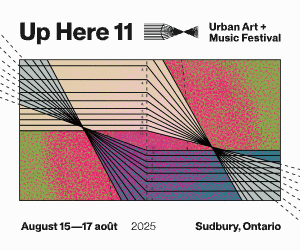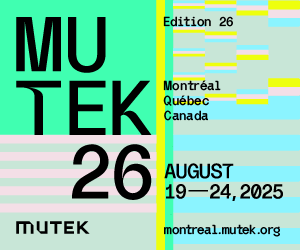Scrolling Through the Years With Tariq
The veteran musician reflects on evolution in music, creativity, and connection ahead of his new album, Scroll Before You Sleep.
By Natasha Rainey
Photo by Chelsey Stuyt
- Published on
Tariq has been in the music game for over 30 years, gaining widespread recognition in 1997 with debut album The Basement Songs and Juno nominated track “Chevrolet Way.” Through his lyrical explorations of racism and religious issues as a South Asian artist, soundtracked by folk rock, Tariq firmly cemented his spot in the late ‘90s zeitgeist.
Succeeding his newfound fame, his widening catalogue of music, released independently, gave way to work with experimental outfit Brasstronaut. These days, Tariq’s creative process has evolved from solo apartment sessions to rich collaborations with bandmates Robert Chursinoff, Peter Carruthers, and Adam Nanji – though you wouldn’t guess it from the billing. “It’s funny that it has my name as the project because I feel like it’s very collaborative as a band,” he explains. What begins as intimate guitar compositions transforms when introduced to the rest of the group. “We change the tempo, the feel. It suddenly becomes a very heavy tune.”
This dynamic has nudged Tariq into fresh creative territory, remoulding his raw assets seamlessly to match the band’s energy. “The songs evolve into something completely different,” he says. And that’s the goal: “I didn’t want to say, ‘Here are my songs, learn them the way I wrote them.’ I wanted them to be different.” Leaning into this musical plurality, he stresses that “the energy is better because everyone feels like they have a stake in it.” For Tariq, the process thrives on “more brains and hearts” coming together and discovering different ideas he wouldn’t have anticipated alone.
In a career that has seen the music industry undergo a rhetorical face lift, nipped and tucked to meet unstable parameters as dictated by social media comment sections, Tariq muses “It’s funny to think that even in the late ’90s, people barely had websites.”

Reflecting on his modest beginnings playing local venues to word-of-mouth crowds, he comments “we were creating a little bit of a buzz in the Calgary scene, and labels were coming out of the blue looking for people to sign. They signed me, and a bunch of other bands, but that was very specific to that time. I don’t think it works that way anymore.” From the grunge-addled airwaves to boyband pandemonium of the early oughts, streaming has been the industry’s real driver of change in recent decades. Seeing fewer big artists, even fewer massive artists and a truckload more independent artists, it has become increasingly hard to sustain a career in music without guaranteed financial backing, and lots of it.
Tariq’s infrequent release patterns and newfound partiality to the EP are a clear consequence of the modern music industry. “I have always loved an album, the idea of it being an art form and it having a narrative and a whole thing from beginning to end,” he says. “But I’ve kind of changed my philosophy a little bit in the last little while from just a completely practical point of view. It’s so expensive to make a record, you’re always applying for these grants, and you don’t know if you’ll get them, and it’s not cheap to make a record.”
He asserts that with albums, the themes and messages can get “a little diluted.” Tariq’s latest singles, “The Ballad of You and Me” and “Architect’s Studio,” will feature on an upcoming 3-track EP alongside “Migration Song.” The compact effort distils Tariq’s less-is-more notion that one can musically commit to “those ideas and that sound and that style,” more than what is usually translated in an album format. Nonetheless, he admits “there’s more coming in the new year for sure.”


Scroll Before You Sleep marks Tariq’s first musical release since 2019. The EP explores themes of isolation and disconnection. “We’re all on our phones, collectively disconnected,” he observes. Despite its undeniable benefits, he notes technology and social media’s role in fostering anxiety and reluctance to engage in real-life connections. Interestingly, these themes in the EP emerged organically. “It’s fun to look at your own work after you’ve done it and see that those threads are there, even when you weren’t necessarily intentionally thinking it.”
Even as he pushes forward, Tariq hasn’t completely abandoned his Chevrolet ways. Recently, in the jam space, the band experimented with newer versions of “Chevrolet Way” despite Tariq’s protests. “I was like, I don’t know. It feels weird to sing that… But this is what those guys are very good at. Like, change the feel completely. And actually, when we got through it, I was like, ‘Eh, it’s not so bad.’” Finding connection to even his own material that feels so far from where he is now creatively, Tariq was met with a reconciliation of identity. “This song kind of does hold up in a funny way. How you might do it musically might be different. But there’s elements of it that are still kind of true to you today. You’re still you.”
Now gently rocking into the swing of 2025, Tariq’s goals remain grounded: book local shows, record new material, and expand beyond Vancouver for regional touring. But for now, you might find him in Mount Pleasant, scrolling through something fashion-related or The New York Times, in his Acne Studios beanie and perfectly uncreased jeans, suggesting that some things – like his attention to detail – never change.
By Leslie Ken Chu
The rock stalwarts lean into vulnerability and nuance, proving that evolution doesn’t have to mean softening the blow.
By Cam Delisle
The pop veteran beamed into Rogers Arena Tuesday night with a glitchy arsenal of remixed hits—some faring better than others in her AI-styled end-of-the-world fantasia.













